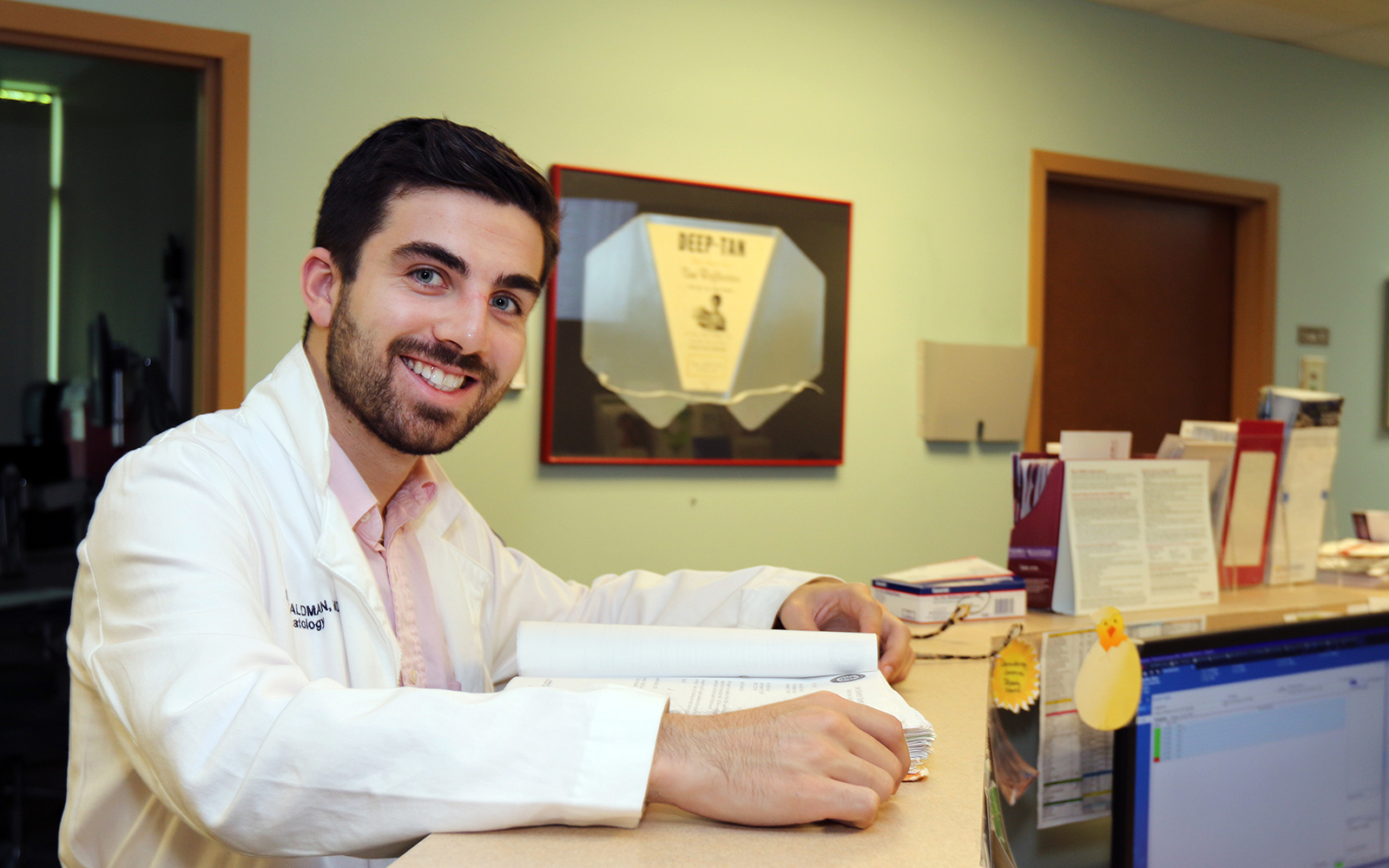
Ugggh, warts. They’re disgusting!
Although they may be a minor-league player in the hierarchy of medical maladies, warts are the source of annoyance, embarrassment and, often, teasing for school-age kids.
Reid Waldman, a dermatology medical resident at UConn Health, has helped devise a revolutionary treatment to eliminate them, by delivering precise wart-busting medication via a microneedle patch that looks similar to a bandage.
Although still in the early stages, Waldman and VeraDermics Inc., the company commercializing this product, are preparing to approach the FDA about the regulatory pathway for this drug-device combination product.
Waldman said he was able to further develop VeraDermics Inc. this summer by completing the Connecticut Center for Entrepreneurship & Innovation’s Summer Fellowship program. The invitational program, part of the School of Business, welcomes innovators with promising startups to develop greater business knowledge and connect with mentors willing to share their expertise.
“I’m very hopeful. Pharmaceutical startups are a high-risk endeavor and much harder to initiate than many other ideas,” he said. “This has been a great opportunity and learning experience. I believe this idea, if executed right, will be kid-friendly and can help a lot of people.”
Warts Are A Formidable Enemy
Warts, which are caused by the human papillomavirus, are a common problem. Twenty percent of all children have them at any given time. Studies have shown that warts typically cause more distress for children than does hair loss, Waldman said.
Warts are an extremely stubborn condition. Untreated, about half of them will go away within two years, but 20 percent will persist for five years. In addition to being a common reason for trips to the dermatologist, warts are also contagious.
“I’ll often see a kid for treatment of warts and then, six months later, I’ll see their sibling,” Waldman said.
The typical physician treatment involves freezing the wart with liquid nitrogen, which, at minus-200 Celsius, is twice as cold as dry ice. “It can be very painful and, obviously, that isn’t ideal, especially for children,” Waldman said.
Over-the-counter products, that contain salicylic acid, work fairly well but have two drawbacks. The first is that they typically make the wart look worse before curing it. They also require daily treatment, over the course of several months, and that’s something that busy families typically struggle to maintain.
The VeraDermics Inc. product is still in pre-clinical development and Waldman will soon ask the FDA for an investigational new drug (IND) designation, which would allow VeraDermics Inc. to begin human trials.
Although microneedle patches are relatively new to dermatology, they have been tested in humans for vaccines and administration of other systemic medications. Unlike other treatments, the microneedle patch is virtually painless, he said. The inventors want the patch to be available by prescription and in a price range that would likely be covered by insurance. Eventually its use could be expanded to treat other skin issues.
Dermatology Hackathon Led to New Business
UConn faculty encouraged Waldman to attend MIT’s Hacking Dermatology competition in 2019, and that’s where he met his current business partner, Tim Durso, a dermatologist in Maryland. They teamed up to create a microneedle patch for the treatment of warts and ended up winning the Hacking Dermatology grand-prize of $30,000.
“I didn’t think I’d ever become an entrepreneur, until that happened,” Waldman said. VeraDermics finished well at this summer’s entrepreneurship program and was one of five companies selected to participate in the School of Business’ Wolff New Venture Competition in October.
Waldman grew up in Kansas and attended an accelerated BA/MD program at the University of Missouri-Kansas City School of Medicine, completing both degrees in just six years. He interned in Cedars-Sinai Medical Center in Los Angeles and, at UConn, he is completing the last year of his residency.
Despite his medical expertise, Waldman said he didn’t have tremendous knowledge about business until he participated in CCEI’s Summer Fellowship program.
“I learned an immense amount about entrepreneurship,” said Waldman, “I never had any formal training about business vocabulary, accounting, or tax structure. The instructors and mentors helped me learn many aspects of business and refine my plans,” he said.
“I also learned how to present my ideas to a businessperson,” he said. “I could make great arguments for my invention to other dermatologists, but now I can make an equally persuasive presentation to venture capitalists.”
Waldman is one of five UConn innovators who will compete in the Wolff New Venture competition and vie for a $20,000 award on Oct. 19. For more information or to watch the competition online, please visit https://ccei.uconn.edu/wolff-new-venture-competition